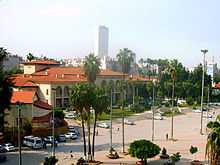Halkevleri
Halkevleri (literally meaning "People's House", also translatable as "Community Centres") is the name of a Turkish state sponsored project, between 1932-1951(1st era) and a civil organization between 1963-1980(2nd era). Halkevleri is active again after 1987(3rd era).[1]

Background
Turkish Republic was proclaimed in 1923 after a serial of wars involving the Ottoman Empire. The wars were very costly. The human loss was great, especially among the intellectuals. Also, the most profitable agricultural land had been lost and the country was economically bankrupt. After the republic was proclaimed, measures were taken to raise the low literacy rate and to improve the economy. However, the great depression was another blow to the new republic. A second problem of the new republic was the reaction of the conservatives against the reforms, especially the secularist practices of the republic.
The scope of the project
Halkevleri was an enlightenment project aimed towards city dwellers to gain support for reforms. It was planned by Kemal Atatürk, the founder of the modern Turkey.
On February 17, 1932, branches of Halkevleri were opened in 17 cities. (Adana, Ankara, Bolu, Bursa, Çanakkale, Denizli, Diyarbakır, Eskişehir, İstanbul, İzmir, Konya, Malatya and Samsun.) But soon, the number increased to 478. Towards 1940, the villages were also included in the project. The sub branches in villages were called Halkodaları (English: People’s rooms) Towards 1950, the total number of these subsections exceeded 4000.
The activities
The purpose of the project was to enlighten the people and to decrease the influences of the conservative circles. Free courses were offered on the topics of literature, drama, music, fine arts, speaking, and writing as well as handicrafts and tailoring. Folksay and folksongs were surveyed. Halkevleri also had 761 libraries and reading rooms.[2]

1st era (1932-1951)
Halkevleri operated as a state organization between from 1932 till 1951. During multiparty period (after 1945) Halkevleri were severely criticized on the ground that this project was a supporter of the governing Republican People’s Party.[3] The opposing Democrat Party won the 1950 elections. On the Aug. 8, 1951 Halkevleri were closed.[4]
2nd era (1963-1980)
In 1963 Halkevleri opened again not by the government but by civil community. 2nd era has was totally independent from the governmental era between 1932-1951. In the 2nd era Halkevleri acted as an umbrella organisation of leftist movements powerful before 1980 Turkish coup d'état. The most ever supported leftist revolutionary movement of Turkey "revolutionary path" Devrimci Yol was active in most Halkevleri branches. This was one of main reasons caused the closing of Halkevleri with 1980 Turkish coup d'état.[5]
3rd era (1987-)


In 1987, Halkevleri opened again by the civil community. Today Halkevleri acts as an umbrella organisation covering struggle for rights including struggle for "right for free education", "right for free medical treatment", "right to housing" etc. Current leader is lawyer Oya Ersoy who is known for human rights trials.[6]
References
- ↑ http://www.halkevleri.org.tr/hakkimizda
- ↑ Halkevleri page (Turkish)
- ↑ Altan Öymen: Öfkeli Yıllar, Doğan Kitap, 2009, ISBN 978-6051114059 , pp 203-220
- ↑ Türkiye’nin 75 yılı, Tempo, İstanbul, 1998
- ↑ http://www.halkevleri.org.tr/hakkimizda
- ↑ http://www.halkevleri.org.tr/halkevleri-yonetim-kurulu